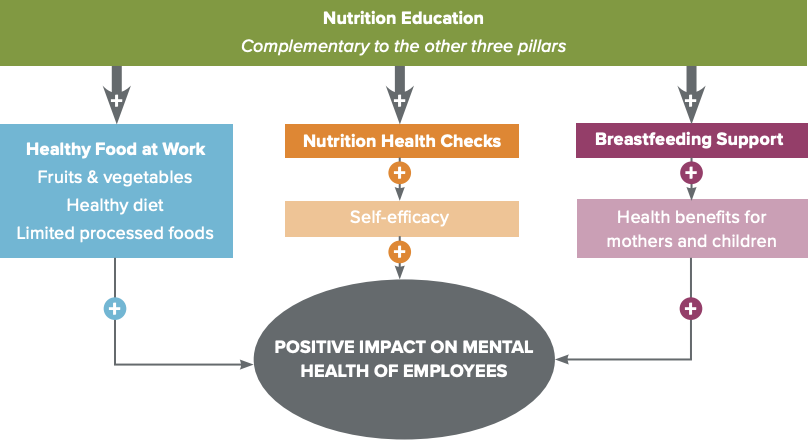By Bärbel Weiligmann and Geke Lobregt — The role of the employer in supporting nutritional and mental health of employees while at work has never been more pronounced than it is today. In March 2022, the WHO wrote how the ‘COVID-19 pandemic triggers 25% increase in prevalence of anxiety and depression worldwide’, representing a real challenge for businesses all over the world. This is especially true when considering how the increasing burden of poor mental health comes with a price: depressive and anxiety disorders cost the global economy more than $1 trillion in lost productivity each year2.
Society pays for the rising mental health costs, but employers do so as well through lost productivity and increased demand for healthcare services by their employees. After all, depressive disorders alone already affect more than 300 million people around the world and are associated with unemployment, poor physical health, impaired social functioning, and, in its most severe forms, suicide2–4.
Conventional treatments are not enough to combat the negative consequences of mental health disorders2. These treatments, which are primarily therapy or medication, are effective only in one in three cases of mood disorders and can also have adverse side effects 2,5,6. Moreover, mental health conditions are often recurrent, with relapse in approximately half of the cases2,7. Even beyond diagnosed conditions, subclinical symptoms of depressive and anxiety disorders affect the wellbeing and functioning of a large proportion of the population3,8.
The case is clear: depressive and anxiety disorders have become a leading cause of disease burden, which needs to be carried by both the public and private sectors. The mental health care system should transform toward a system that utilizes a holistic approach by bridging the gap between different dimensions of health9, and, with people spending so much of their time at their place of work, it is clear businesses need to play their part in supporting the holistic health of their employees.
A promising approach for employers has been outlined in the blog about mental health and nutrition, where the association between nutritional and mental health was explained10. Companies and corporate organisations increasingly address physical and mental health as two dimensions of wellbeing, but few address and recognize their correlation11–17. This appears to be a missed opportunity. Comprehensive policies and actions that improve nutritional outcomes through the workplace could also enable employers to improve employees’ mental health and wellbeing and generate a return on investment of 6:110,18.
In fact, employers can contribute to reducing the mental health burden of employees, by following these five nutritional, evidence-based steps:
#1 Facilitate fruit and vegetable consumption: Fruits and vegetables have favourable effects on the prevention of depression and stress, due to their high content of antioxidants and the presence of folate. 2,3,8,19–21.
TIP: Place a basket of free fruits and snack vegetables at a visible and accessible place for your employees.
#2 Include fish in at least two meal servings per week: Fish consumption has a protective effect on depression and can improve mood in major depressions. This can be attributed to its high content of omega-3 fatty acids19–21.
TIP: Include smaller pieces of fish in meals like curries, lasagnes, stews or noodles to make serving fish to each employee feasible.
#3 Include protein in each meal: For the brain to function optimally, essential amino acids (the building blocks of protein) should be ingested via the diet 20,21. Include 15-30 grams of protein per meal, which is equivalent to 100 grams of chicken, nuts, chickpeas, soy, tempeh, or three eggs.
TIP: Plant-based proteins sometimes lack one or two essential amino acids. So, try to increase the diversity of proteins21,22.
#4 Opt for whole wheat food products: Whole wheat food products contain more fibre, vitamins and minerals compared to refined grains23. Fibre promotes a healthy gut microbiota, which is associated with lower risk on depression8,24–26.
TIP: Encourage employees to consume fruits or nuts instead of a cookie. This will help them to maintain their concentration levels, by preventing the occurrence of a sugar-dip27.
TIP: Exchange white rice, white bread (buns), pasta, wraps or couscous for their whole-wheat variants in the canteen. It helps the gut function properly and keeps people saturated longer28.
#5 Replace high sugar drinks with water and other sugar-free beverages: People can often easily and quickly ingest a large amount of sugar through high-in-sugar drinks. High sugar intake is associated with an increased risk of depression because it alters endorphin levels and oxidative stress 19. Water, as one zero sugar alternative, for example, keeps the body hydrated.
TIP: A healthier food environment makes it easier for employees to choose healthier products29. Therefore, make drinking water readily available and more attractive by, for example, making infused water. Provide a water jug with slices of lemon, cucumber or mint leaves near your employees.
There is no doubt that improving employees’ diets makes them less likely to be affected by mental health issues. This is intrinsically connected to higher morale among employees and, therefore, staff loyalty. It also generates a positive financial return through increased productivity and reduced absenteeism rates. It is very clear that providing healthy diets for employees benefits employers as much as those employees.

This article specifically focuses on what employers can do to provide healthier food at work. However, a comprehensive workforce nutrition programme would also include breastfeeding support, nutrition-focused health checks and nutrition education. The Workforce Nutrition Alliance supports organisations in developing workforce nutrition programmes which benefit both employees and the business, playing a holistic role in providing a happier and healthier environment for your workforce.
Bärbel Weiligmann, Workforce Nutrition Programme Lead
bweiligmann@gainhealth.org
Geke Lobregt, MSc Nutrition and Health
globregt@gainhealth.org
References
1. WHO. COVID-19 pandemic triggers 25% increase in prevalence of anxiety and depression worldwide. Published 2022. https://www.who.int/news/item/02-03-2022-covid-19-pandemic-triggers-25-increase-in-prevalence-of-anxiety-and-depression-worldwide
2. Lassale C, Batty GD, Baghdadli A, Jacka F, Kivimäki M, Akbaraly T. Healthy dietary indices and risk of depressive outcomes : a systematic review and meta-analysis of observational studies. 2021;(2019):965-986. doi:10.1038/s41380-018-0237-8
3. Firth J, Marx W, Dash S, et al. The Effects of Dietary Improvement on Symptoms of Depression and Anxiety : A Meta-Analysis of Randomized Controlled Trials. 2019;0(April). doi:10.1097/PSY.0000000000000673
4. WHO. Depression. Published 2021. https://www.who.int/en/news-room/fact-sheets/detail/depression
5. van Zoonen K, Buntrock C, Ebert DD, et al. Preventing the onset of major depressive disorder: A meta-analytic review of psychological interventions. Int J Epidemiol. 2014;43(2):318-329. doi:10.1093/ije/dyt175
6. Bet PM, Hugtenburg JG, Penninx BWJH, Hoogendijk WJG. Side effects of antidepressants during long-term use in a naturalistic setting. Eur Neuropsychopharmacol. 2013;23(11):1443-1451. doi:10.1016/j.euroneuro.2013.05.001
7. Burcusa SL, Iacono WG. Risk for recurrence in depression. Clin Psychol Rev. 2007;27(8):959-985. doi:10.1016/j.cpr.2007.02.005
8. Firth J, Gangwisch JE, Alessandra B, Wootton RE, Mayer EA. Food and mood: how do diet and nutrition affect mental wellbeing? BMJ. 2020;369(m2440). doi:10.1136/bmj.m2440
9. Vreeland B. Bridging the gap between mental and physical health. J Am Psychiatr Nurses Assoc. 2004;10(3 SUPPL.):26-33. doi:10.1177/107839030401000303
10. Stone G, Weiligmann B. Mindful eating or eating for your mind? Diet and mental health at the workplace in a Covid-19 era. Published 2021. https://workforcenutrition.org/mindful-eating-or-eating-for-your-mind-diet-and-mental-health-at-the-workplace-in-a-covid-19-era/
11. McKinsey & Company. Well-being in the workplace. https://www.mckinsey.com/featured-insights/well-being-in-the-workplace
12. Accenture. Supporting mental health & wellness, every day. doi:https://www.accenture.com/nl-en/about/inclusion-diversity/mental-wellness
13. PwC. Be Well, Work Well. https://www.pwc.com/us/en/about-us/purpose-and-values/be-well-work-well.html
14. Unilever. Employee wellbeing. https://www.unilever.com/planet-and-society/responsible-business/employee-wellbeing/
15. WBCSD. Healthy People, Healthy Business: Embedding a Culture of Employee Health and Wellbeing.; 2022. https://www.wbcsd.org/Programs/People-and-Society/Health-and-Wellbeing/Healthy-people-healthy-business/Resources/Healthy-People-Healthy-Business-Embedding-a-culture-of-employee-health-and-wellbeing
16. BBC. How diet can affect your mental wellbeing. https://www.bbc.co.uk/food/articles/diet_wellbeing
17. Marmot M, Alexander M, Allen J, Munro A. The Business of Health Equity: The Marmot Review for Industry: Institute of Health Equity.; 2022. https://www.instituteofhealthequity.org/resources-reports/the-business-of-health-equity-the-marmot-review-for-industry
18. Nyhus Dhillon C, Weiligmann B. The Evidence for Workforce Nutrition Programmes. Published online 2019.
19. Li Y, Lv M, Wei Y, et al. Dietary patterns and depression risk : A meta-analysis. 2017;253:373-382. doi:10.1016/j.psychres.2017.04.020
20. Jacka FN, Neil AO, Opie R, et al. A randomised controlled trial of dietary improvement for adults with major depression ( the ‘ SMILES ’ trial ). Published online 2017:1-13. doi:10.1186/s12916-017-0791-y
21. Khanna P, Chattu VK, Aeri BT. Nutritional Aspects of Depression in Adolescents ‑ A Systematic Review. Published online 2019:1-9. doi:10.4103/ijpvm.IJPVM
22. Mariotti F, Gardner CD. Dietary protein and amino acids in vegetarian diets—A review. Nutrients. 2019;11(11):1-19. doi:10.3390/nu11112661
23. Okarter N, Liu RH. Health benefits of whole grain phytochemicals. Crit Rev Food Sci Nutr. 2010;50(3):193-208. doi:10.1080/10408390802248734
24. Fardet A. Whole Grains from a Mechanistic View. J Cereal Foods World. Published online 2013:1-3.
25. Järbrink-Sehgal E, Andreasson A. The gut microbiota and mental health in adults. Curr Opin Neurobiol. 2020;62:102-114. doi:10.1016/j.conb.2020.01.016
26. Methiwala HN, Vaidya B, Addanki VK, Bishnoi M, Sharma SS, Kondepudi KK. Gut microbiota in mental health and depression: Role of pre/pro/synbiotics in their modulation. Food Funct. 2021;12(10):4284-4314. doi:10.1039/d0fo02855j
27. Gangwisch JE, Hale L, Garcia L, et al. High glycemic index diet as a risk factor for depression: Analyses from the Women’s Health Initiative. Am J Clin Nutr. 2015;102(2):454-463. doi:10.3945/ajcn.114.103846
28. Slavin J, Green H. Dietary fibre and satiety. Nutr Bull. 2007;32(SUPPL.1):32-42. doi:10.1111/j.1467-3010.2007.00603.x
29. Leng G, Adan RAH, Belot M, et al. The determinants of food choice. Proc Nutr Soc. 2017;76(3):316-327. doi:10.1017/S002966511600286X
